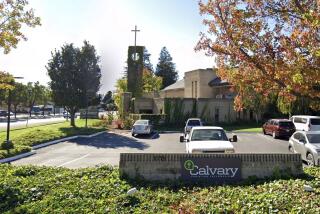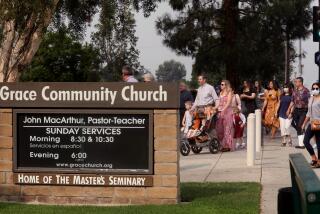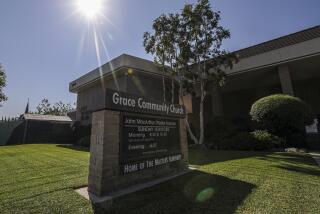Do coronavirus social distancing orders violate religious freedom? Local pastors say yes
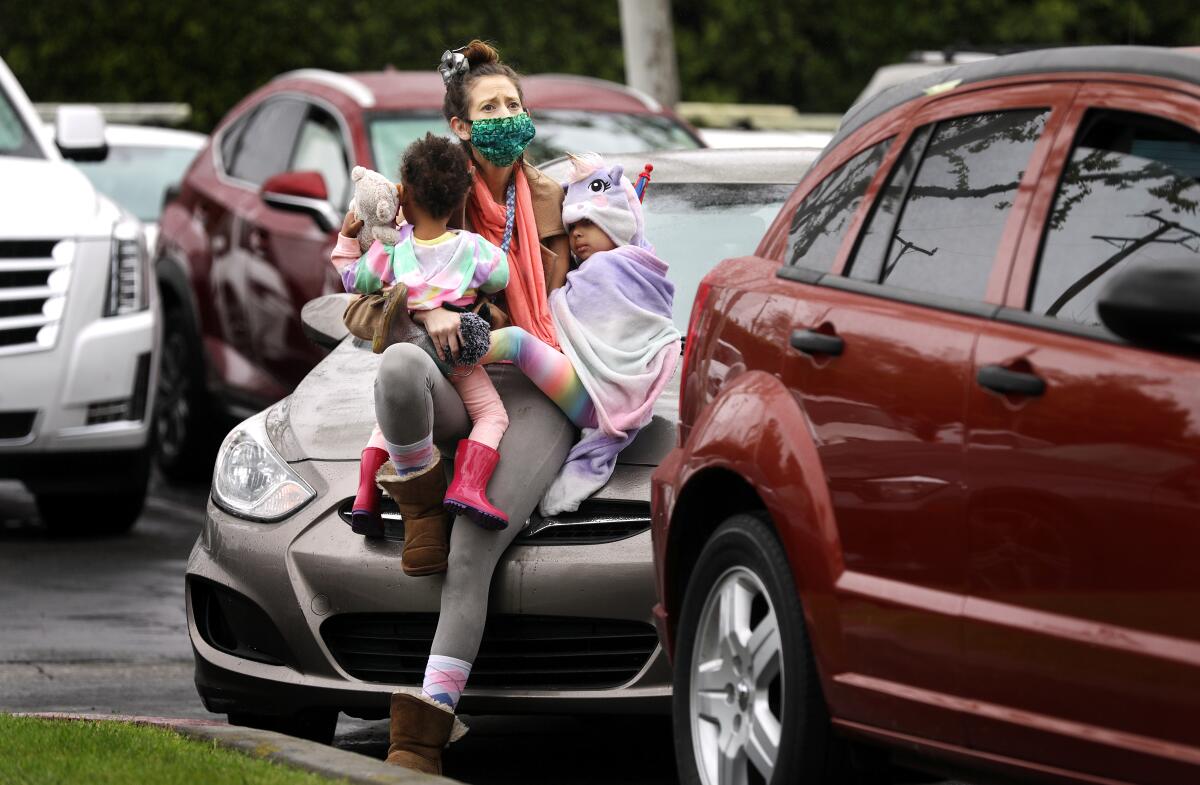
On Easter Sunday at a church in Fontana, a pastor delivered a fiery sermon to worshipers who crowded the pews in defiance of government orders prohibiting in-person services even on this holiest of days.
The next day, the pastor, Patrick Scales of the Shield of Faith Family Church, filed a lawsuit contesting the stay-at-home orders as a violation of 1st Amendment religious freedom.
“We’re not going to stay home. We went to the house of God anyway,” Scales thunders in a video of the Easter service posted on Facebook. “We were threatened by jail. We were threatened by a fine. I chose to come worship.”
People in the pews cheered and applauded, many wearing masks and gloves but appearing to be closer to each other than the six-foot distance mandated by officials to stop the spread of the coronavirus that has killed more than 126,000 worldwide.
Much about the COVID-19 pandemic is unprecedented, from the mass closure of schools and restaurants to the social distancing rules requiring that religious services be held online only.
The U.S. Constitution is also being tested in unprecedented ways, with religious leaders from Mississippi to Kentucky to San Diego County suing their governments, asserting that they are being treated differently from businesses that can remain open, such as supermarkets and liquor stores.
Other plaintiffs in the lawsuit include one of Scales’ parishioners, Wendy Gish, and two Riverside County pastors, James Moffatt of Church Unlimited in Indio and Brenda Wood of Word of Life Ministries International Inc. in Riverside.
Moffatt was fined $1,000 for conducting a church service on Palm Sunday, according to the complaint.
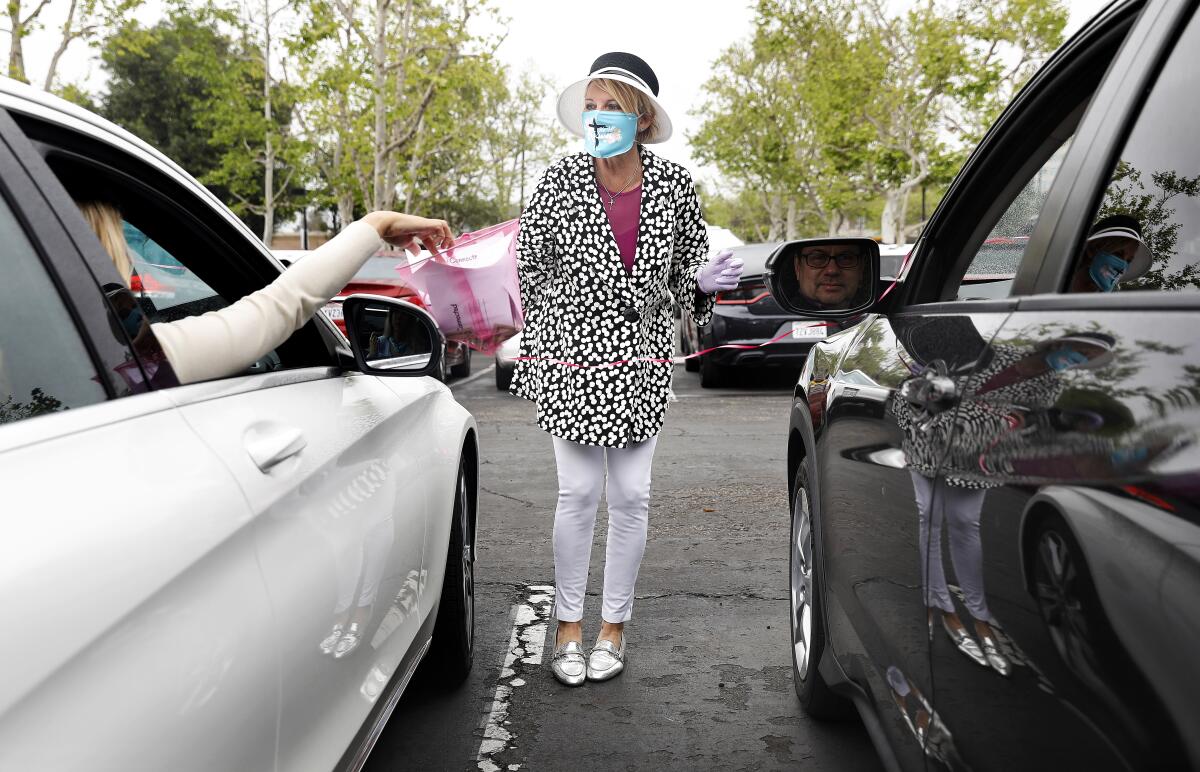
On Easter Sunday, his church held a drive-in service, which was permitted by Riverside County only for that weekend.
Photos on the church’s Facebook page show cars lined up in the parking lot, where a live band performed. Some worshipers emerged into the sunshine, standing on the curbs or in the narrow gaps between cars.
“It doesn’t work for the government to tell you or me that it’s good enough to load up Zoom and your high-speed internet and do your service remotely,” said the plaintiffs’ lead attorney, Harmeet Dhillon. “That’s incredibly arrogant and out of touch.”
Dhillon noted that in rural areas, many people do not have internet access. On Tuesday, she filed for a temporary restraining order to obtain a ruling on whether the defendants, who include Gov. Gavin Newsom and officials from Riverside and San Bernardino counties, should allow the churches to resume in-person services.
A hearing before U.S. District Judge Jesus G. Bernal is scheduled for June 1.
Newsom’s office did not respond to a request for comment.
A spokeswoman for Riverside County said the county is reviewing the lawsuit but could not comment because of the ongoing litigation.
San Bernardino County officials were also reviewing the complaint and “will continue to act in the best interests of the public’s health and safety,” a spokesman said.
Constitutional law scholars interviewed by The Times were divided on the strength of Scales’ case.
During an infectious disease pandemic, government officials have a public health interest in restricting people’s movements, which can clash with constitutional rights such as freedom of religion, speech and assembly.
Barry McDonald, a professor at Pepperdine’s Caruso School of Law, said the plaintiffs have a “decent claim.”
The government must have a compelling reason to treat churches differently from other organizations it has deemed essential, he said.
If churches agree to maintain safe social distancing, according to McDonald, they could argue for a carve-out like supermarkets and pharmacies.
“These are important material needs that must be fulfilled, important social needs — courts, day care, child care,” he said. “You could say spiritual needs are essential and necessary as well.”
Aaron Caplan, a professor at Loyola Law School and a former attorney at the American Civil Liberties Union of Washington, questioned why the plaintiffs sued so quickly instead of waiting to see how much law enforcement would crack down on them.
But he agreed with McDonald that the government must have a “really good reason” for not putting churches on the list of businesses that can still operate.
“Maybe the best thing to do would be to design religious exceptions, because religion is important to people,” he said. “Do we want the government to say we think the grocery store and the drugstore are more important than your religion?”
In Kentucky, a federal judge granted the On Fire Christian Center’s request for a temporary restraining order against the city of Louisville so it could hold drive-in services.
Because Louisville allows drive-through liquor services, it must allow church services, U.S. District Judge Justin R. Walker ruled.
“But if beer is ‘essential,’ so is Easter,” Walker wrote.
In San Diego, a judge came out on the other side, rejecting a church’s request for a temporary restraining order so it could hold Easter services.
The right to freedom of religion doesn’t “include the right to expose the community to communicable disease,” U.S. District Judge Cynthia A. Bashant said.
In Mississippi, U.S. Atty. Gen. William Barr went to bat for a church whose members were fined $500 each for attending parking lot services while drive-in restaurants could continue to operate.
“The city appears to have thereby singled churches out as the only essential service ... that may not operate despite following all … recommendations regarding social distancing,” he wrote in a news release announcing that the Department of Justice had filed a brief in support of the church.
Lawrence Sager, a professor at the University of Texas at Austin School of Law and visiting professor at UCLA School of Law, said the Riverside and San Bernardino county churches did not provide strong evidence of unconstitutional religious discrimination.
Whereas people cannot rely exclusively on online deliveries of food and medicine, churches can deliver their messages online, he said.
“They can behave virtually and do what needs to be done virtually. You can’t give someone food virtually or medicine virtually,” he said. “I think that makes the case that churches aren’t being treated fairly a weak case — a very weak case.”
But on Easter in Fontana, Scales recited the 1st Amendment and said the church was “facing the enemy” as best it could by taking legal action.
“We can’t roll over and play dead. The devil’s playing for keeps,” he said. “We’re living in the last days. It’s time to stand up — hallelujah — not to run and hide.”
The applause from the pews intensified. People rose to their feet, waving hands in rubber gloves.
The Associated Press contributed to this report.
More to Read
Sign up for Essential California
The most important California stories and recommendations in your inbox every morning.
You may occasionally receive promotional content from the Los Angeles Times.
